Books
Books by William Franke
(Click on titles or covers for detailed information and reviews)
The Sign of the Swan: How French Symbolist Poetry Re-envisions Reality (London: Anthem Press, 2026)
“This volume offers a lucid and intellectually bold reappraisal of Mallarmé’s poetics. It charts a distinctive path through Symbolist aesthetics and critical theory, articulating a compelling interpretive vision that reflects the depth and coherence of William Franke’s broader philosophical project.” — Andrea Schellino, University of Louvain, editor of the Pléiade edition of Baudelaire.
William Franke, The Sign of the Swann, author presentation

“William Franke’s voice, at a time when wokeism is on the defensive, is unique in the present concert of woke theory. Provocatively, he compares wokeism with René Girard’s theory of scapegoating as the definitive act of self-sacrifice. Wokeness reflects the pathos of our contemporary social struggles, which leads us to important questions about the coherence of our societies.”
—Thorsten Botz-Bornstein, Professor of Philosophy, Gulf University, Kuwait, editor of Tracking Global Wokeism (2025)
“Franke writes as an intellectual reflecting on the lived experience of ideological oppression. His analysis is profoundly personal and philosophical, exploring intellectual submission’s psychological and spiritual dimensions. Franke’s book, like Milosz’s The Captive Mind and Orwell’s 1984, is a cautionary narrative about the fragility of freedom and the resilience required to resist the allure of oppressive systems.”
—Andrzej Wierciński, Distinguished Professor, Faculty of Artes Liberales, University of Warsaw
Social Identities and Social Justice doesn’t just critique wokeism as a social revolution devolved into an intolerant religion. It tries to redeem it from an “apophatic” perspective that goes beyond “positive, divisive, sectorial identifications.” It points to a path of salvation present in Christian religious traditions, as well as in Judaism, Islam, Buddhism, Hinduism, Taoism, the Sioux Great Spirit or Mystery Wakan Tanka, Navajo Hózhǫ́, and countless other cultures. The limits of our human relation to ultimate reality makes us mutually dependent in seeking justice beyond anyone’s ability to identify it. In Franke’s words, “concerning God—and this goes equally for Justice—all our human conceptions are inadequate; all our speech is insufficient.” Franke’s argument is clear and brilliant throughout the book.
–Montserrat Herrero, Professor of Philosophy, University of Navarra
Pandemics and Apocalypse in World Literature: The Hope for Planetary Salvation (Routledge 2025)

Publishers Website for Pandemics and Apocalypse in World Literature
William Franke delves into how disease and death force humanity to confront its deepest vulnerabilities in this profound exploration of pandemics in literature. Much like apocalyptic events, pandemics raise fundamental questions about the viability of human society, the fragility of life, and the structures that bind us together. These crises level all distinctions, revealing the often-ignored truths about inequality, mortality, and our shared existence. Yet amidst the despair, the text argues for hope—not as a solution to our vulnerability, but as an openness to life in all its uncertainty. This hope inspires us to transcend self-preservation, fostering solidarity and collective action toward a more meaningful life. The book illuminates the inexpressible dimensions of these world-shattering experiences through personal witness and reflection, offering a powerful meditation on the human condition.
–Prof. Massimo Lollini, Professor Emeritus of Italian, University of Oregon, USA
Pandemics and Apocalypse in World Literature is not just a scholarly survey but a constructive approach that gives itself the task to wrest possibilities of an eschatological hope from the night of apocalyptic despair. Written in the wake of the recent pandemics, the work deploys negative theology at its most creative possibility: it consists of an infinite affirmation of the unconditioned which nevertheless remains irreducibly ineffable. Franke brings together, without reducing their disparate character, the agonal traits of the end and the beginning, of despair and hope, of the abyss of the night and the first morning glow; and he shows, through rigorous exegesis of some of the very difficult texts, that perhaps the only task that is worthy today is to see the possibility of the radical, incalculable alterity that our history never ceases exposing us to. Dense, profound, thought-provoking.
–Prof. Saitya Brata Das, Associate Professor, JNU, India
William Franke’s history of pandemic literature, from the ancient world to COVID, helps us understand what we are all still wondering about: what exactly happened to the us in 2020? The pandemic made us all more aware of the contingency of order, and the religious significance of this awarness, while overlooked by many, is for Franke the big take away. An eye-opener.
–Prof. Sean J. McGrath, Professor, Memorial University, Canada
William Franke’s book is exceptionally important as it masterfully combines three areas of expertise: literary, anthropological, and philosophical-theological. On one hand, it offers an erudite and nearly unprecedentedly broad reconstruction of the phenomenology of the plague from its origins to the present, covering not only Western cultures but also Jewish and Chinese perspectives. On the other hand, it presents a sociological reflection on the deep-rooted causes of the plague’s reemergence (today in the form of Covid-19) and its philosophical and existential implications. Saint Paul’s saying, spes contra spem (hope against hope) is reimagined and explored within the context of apophatic theology. The reference to the Native American model of vital experience, along with Western and Eastern mysticism, underscores the depth of this approach.
–Walter Minella, Philosopher in Neurotheoretical Research Group, Pavia, Italy
William Franke meditates on the currently constitutive crisis of human materiality, as it manifests in the collective imbalance symptomatized by an epidemic. and crashes in on every shoreline of our ecological future. In his distinctive reading of the unspeakability of our circumstance through apophasis, and the intensity of the crisis through apokalypsis, fresh insight breaks through for more spirited collective response.
–Prof. Catherine Keller, G.T. Cobb Professor of Constructive Theology, Drew Theological School, USA
Don Quixote‘s Impossible Quest for the Absolute in Literature: Fiction, Reflection, and Negative Theology (Routledge 2024)

Critics Views:
“This is one of the very best, most interesting studies of Cervantes’ Don Quixote that I have read in some time. . . . I consistently found myself engaged by the argument, fascinated by the detailed analyses, and impressed by the depth of thought in evidence in this work. It’s clear that Franke really “gets” the complexity and the importance of Don Quixote, and he does a superb job communicating this to the reader. . . .In a scholarly landscape that is littered with studies of Don Quixote that often fail to do justice to Cervantes’ text, Franke’s study stands out for the way in which it truly captures the profundity of the work.”
–Anthony J. Cascardi, Sidney and Margaret Distinguished Professor of Comparative Literature, University of California, Berkeley
A celebrated scholar of Dante and of the discipline known as apophatic theology or negative theology, William Franke in Don Quixote’s Impossible Quest for the Absolute in Literature offers us a tour-de force interpretation of how Cervantes searches for God’s revelation of truth in theologically diverse apophatic discourses. Franke’s exegetical reflections converse with Ortega’s, Unamuno’s, and Zambrano’s respective meditations on Cervantes’s masterpiece, allowing the reader to get a taste of the parodic laughter in Don Quixote, a mode of discourse that speaks (or rather un-speaks) of the impossible quest for the transcendent and the divine. Franke’s is a complex and excellent book that sheds insight upon Don Quixote’s experience of the divine around him.
–Antonio Cortijo Ocaña, Professor, University of California, Santa Barbara
William Franke’s Don Quixote’s Impossible Quest for the Absolute in Literature: Fiction, Reflection, and Negative Theology could hardly be a more ambitious project, and I believe that the results are brilliant. Professor Franke has analyzed Don Quixote using his unique and wide-ranging background in literature, culture, theology, and philosophy, not to mention his familiarity with the meta- offspring of Cervantes’s work. I find the framing of the theses and arguments to be superb. The critic lays the foundations for his particular readings, upon which readers can reflect and debate.
-Edward H. Friedman, Gertrude Conaway Vanderbilt Professor in the Humanities, Vanderbilt University, Tennessee
Dantologies: Theoretical and Theological Turns in Dante Studies (Routledge 2024) Routledge Studies in Medieval Literature and Culture

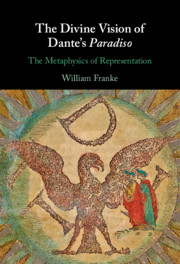
Publishers Website for The Divine Vision of Dante’s Paradiso
Dante’s Vita nuova and the New Testament: Hermeneutics and the Poetics of Revelation (Cambridge University Press, 2021)
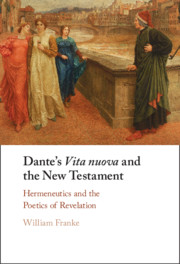
Publisher’s Website for The Vita Nuova and the New Testament
Dante’s Paradiso and the Theological Origins of Modern Thought: Toward a Speculative Philosophy of Self-Reflection (Routledge, 2021)

Publisher’s Website – Routledge – for Dante’s Paradiso and the Theological Origins of Modern Thought: Toward a Speculative Philosophy of Self-Reflection
The Revelation of Imagination: From Homer and the Bible through Virgil and Augustine to Dante (Northwestern University Press, 2015)
A Philosophy of the Unsayable (University of Notre Dame Press, 2014)
Poetry and Apocalypse: Theological Disclosures of Poetic Language (Stanford University Press, 2009)
forthcoming September 2021:
The Divine Vision of Dante’s Paradiso: The Metaphysics of Representation
(Cambridge: Cambridge University Press, 2021)
Dante’s Vita nuova and the New Testament: Hermeneutics and the Poetics of Revelation
(Cambridge: Cambridge University Press, 2021)
***********************************************************************************************
Books by William Franke broken down by Subject Area
(click on titles for detailed information)
Apophatic Philosophy
On the Universality of What is Not: The Apophatic Turn in Critical Thinking
Apophatic Paths from Europe to China: Regions Without Borders
On What Cannot Be Said: Apophatic Discourses in Philosophy, Religion, Literature, and the Arts
Volume 1: Classical Formulations
Volume 2: Modern and Contemporary Transformations
Transcendence, Immanence, and Intercultural Philosophy
Applications of Apophatic Philosophy to Urgent Contemporary Issues
Theory and Criticism
The Sign of the Swan: How French Symbolist Poetry Re-envisions Reality
Don Quixote‘s Impossible Quest for the Absolute in Literature: Fiction, Reflection, and Negative Theology
A Theology of Literature: The Bible as Revelation in the Tradition of the Humanities
Secular Scriptures: Modern Theological Poetics in the Wake of Dante
The Revelation of Imagination: From Homer and the Bible through Virgil and Augustine to Dante
Poetry and Apocalypse: Theological Disclosures of Poetic Language
Dante and Philosophy/Theology
Dantologies: Theoretical and Theological Turns in Dante Studies (Routledge 2023) Routledge Studies in Medieval Literature and Culture
Dante’s Vita nuova and the New Testament: Hermeneutics and the Poetics of Revelation
The Divine Vision of Dante’s Paradiso: The Metaphysics of Representation
Dante’s Paradiso and the Theological Origins of Modern Thought: Toward a Speculative Philosophy of Self-Reflection
Dante and the Sense of Transgression: “The Trespass of the Sign”
************************************************************************************************ Books and Articles by Others about William Franke’s Work
Books by Others about William Franke’s Books + General Review Essays
Contemporary Debates in Negative Theology and Philosophy, eds. Nahum Brown and J. Aaron Simmons (London: Palgrave MacMillan, 2017) (xi + 464 pages), Palgrave Frontiers in Philosophy of Religion Series (includes responses by William Franke to each of fourteen essays)
Syndicate Theology, vol. 3, issue 2, March/April (2016) “William Franke, A Philosophy of the Unsayable,” pp. 101-148
(online and print versions available)
Syndicate Theology Forum on A Philosophy of the Unsayable by
4.11.16 |
Symposium Introduction
Symposium Panelists
General Review Essays:
Steven Knepper, “Literary Revelations: On William Franke and the Bible,“ Voegelin Review August 24, 2024
Sabine Lenore Müller, “Apophasis as a Means of Expressing Ecological Indeterminacy: Reading Modernist Poetry with William Franke’s A Philosophy of the Unsayable,” Contemporary Debates in Negative Theology and Philosophy, pp 295-320
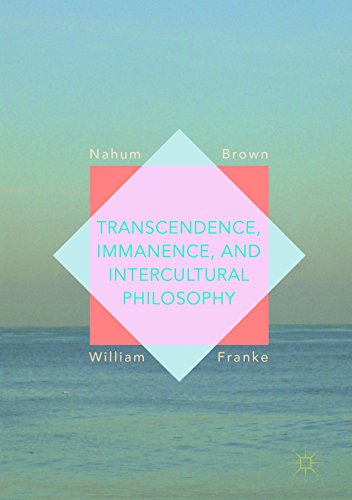
************************************************************************************************
Serial presentation in reverse order of appearance of William Franke’s books (duplicates information in individual book files)
Apophatic Paths from Europe to China: Regions Without Borders
Video-recorded Lecture: Method and Mysticism in Intercultural Philosophy
Publisher’s Website: SUNY Press. Series in Chinese Philosophy and Culture, edited by Roger Ames
An encounter between Franke’s philosophy of the unsayable and Eastern apophatic wisdom in the domains of poetry, thought, and culture.
In Apophatic Paths from Europe to China, William Franke brings his original philosophy of the unsayable, previously developed from Western sources such as ancient Neoplatonism, medieval mysticism, and postmodern negative theology, into dialogue with Eastern traditions of thought. In particular, he compares the Daoist Way of Chinese wisdom with Western apophatic thought that likewise pivots on recognizing the nonexistent, the unthinkable, and the unsayable. Leveraging François Jullien’s exegesis of the Chinese classics’ challenge to rethink the very basis of life and consciousness, Franke proposes negative theology as an analogue to the Chinese model of thought, which has long been recognized for its special attunement to silence at the limits of language. Crucial to Franke’s agenda is the endeavor to discern and renew the claim of universality, rethought and reconfigured within the predicament of philosophy today considered specifically as a cultural or, more exactly, intercultural predicament.
“Franke rethinks East-West philosophical traditions to show the subcurrents in Western thought that correspond to the centrality of apophasis in Chinese and Asian thought, whether it be the empty transcendent or the Way as indicator or allusion. He shows how apophatic thought confounds the transcendent-immanent duality and reworks it into an inseparability that can be consequential for our philosophical understanding of a ‘natural’ universality.” — Prasenjit Duara, author of The Crisis of Global Modernity: Asian Traditions and a Sustainable Future
“The broad coverage of William Franke’s book is impressive as it discusses many issues in philosophy, religion, and literature, but at the same time it also has a clear focus and a special ‘apophatic’ approach to the various issues in the humanities. It is innovative, creative, and makes an important contribution to East-West comparative studies and cross-cultural understanding. Highly recommended.” — Zhang Longxi, author of From Comparison to World Literature
“By highlighting Western phenomena that are comparable to the Chinese, mainly in the apophatic tradition, Franke succeeds in exposing the biases and blind spots in Jullien’s as well as in Hall’s and Ames’s respective treatment of Chinese ‘philosophy.’ This book will stand as an important resource for the future of scholarly debates in these areas.” — Karl-Heinz Pohl, editor of Chinese Thought in a Global Context: A Dialogue Between Chinese and Western Philosophical Approaches
A Theology of Literature: The Bible as Revelation in the Tradition of the Humanities
Theology of Literature – Franke.cover
“Well known for his distinguished work on mysticism and the apophatic, in this new monograph William Franke offers a remarkable development in the field of literature and theology. Building on the foundations laid by earlier scholars in both biblical studies and literature, Franke examines different genres in both testaments, from myth, epic, the prophetic, the apocalyptic, and the gospel, to offer a biblical theology that is inherent within the text rather than imposed externally upon it. It is a brilliant example of what Paul Ricoeur once called thinking biblically, and will be a profoundly important book for anyone within the humanities as well as theologians, liturgists, and biblical critics.”
—David Jasper, University of Glasgow
“William Franke’s book demonstrates the variegated way in which the Bible provides ‘a model for humanities texts.’ Not only does he rightly seek to relate the reading of the Bible to other texts in the humanities, but also underlines the fundamental importance which the Bible has had in its contribution to hermeneutics. Historical contextuality, and the way which texts are a means of self-reflection, have been part and parcel of engagement with the Bible down the centuries and are all too easily ignored in modern biblical scholarship.”
—Christopher Rowland, University of Oxford
“This is a brilliant new book by one of the world’s most accomplished scholars in the area of literature and theology. Offering a lucid and compelling account of the nature of revelation, Franke reads a range of biblical texts in ways that are simultaneously thought-provoking, illuminating, readable, and constructive. A Theology of Literature is a wonderful achievement, and certainly worth reading.”
—Mark Knight, Lancaster University
“William Franke views the Bible with a fresh eye. He has the scholar’s learning, the theologian’s quest for revelation, and the poet’s understanding of where language can take us. He writes with extraordinary clarity about complex issues and texts; he gives a new sense of all that the literature of the Bible has in store.”
—Peter S. Hawkins, Yale Divinity School
David Jasper in Literature and Theology
Secular Scriptures: Modern Theological Poetics in the Wake of Dante
Link to publishers web page about this book
“In a series of dazzling essays taking Dante as their starting point, William Franke finds the trace of religious meaning throughout different forms of modern poetry, whose gaps and discontinuities he claims point to the ineffable beyond language. The book will prove an immense provocation and stimulus to all those who thought they had sorted out the relation of theology to modern poetry.” —Jeremy Tambling, University of Manchester
“In twenty-five years of teaching a ‘great books’ curriculum, I have rarely read a study so finely attuned to the spiritual resonances of classic texts. I will be consulting William Franke’s Secular Scriptures for as long as I continue teaching and writing about the religious dimension of literature, and its enduring relevance to our ‘secular age.’” —Paul J. Contino, Pepperdine University
“In Secular Scriptures, William Franke rejects the received wisdom that sacred and secular are essentially opposed to one another. He does this by asking us to think about where these alleged oppositions in fact converge—in a venerable Western literary tradition. Surveying a broad spectrum of works written ‘in the wake of Dante,’ he argues that ‘self reflexivity,’ subjective human experience and reflection, has become for modern poets the locus of revelation, a form of scripture. Building on his extensive previous explorations of ineffability, ‘on what cannot be said,’ he uncovers the richness—both literary and philosophical —of inventive language that speaks in order to reveal ‘the spiritual mysteries of the letter,’ to gain access to what ultimately lies beyond the reach of words.” —Peter Hawkins, Yale Divinity School
“I read Secular Scriptures almost without putting the work down. Readers in fields from fin-de-siècle decadence to ‘post-postmodernism’ in poetry, especially those with interest in religion and literature studies, will be delighted by the way Dante is recast here to preface twentieth- and twenty-first-century developments. Franke’s way of thinking backwards from recent postsecular theory is beguiling and transformative; the movement forward in the final chapter, via Dante’s emerging again at the end as at the beginning, is really rather beautiful.” —Romana Huk, University of Notre Dame
“William Franke has written, in a luminous prose, an enthralling book about a pivotal issue in literary studies: the esthetics of visionary literature. The questions Franke raises—philosophy of language, the nature of mystical insights, their modes of representation, and the revelations of poetic knowledge—find in Dante, in the Romantic poets of Europe, and in the radical philosophical speculations of the twentieth century a fascinating articulation through which the reader can experience the depths of the high culture of the West.” —Giuseppe Mazzotta, Yale University
Authorial Intentions: Interview with Chris Benda
Chad Schrock in Literature and Theology
Katherine Eggert, Studies in English Literature
Link to publishers web page about this book
Link to Newberry Center Annual Dante Lecture
The Revelation of Imagination: From Homer and the Bible through Virgil and Augustine to Dante
Link to Project Muse: The Revelation of Imagination
Wayne Cristaudo, “The Wisdom of the Western Canon,” Review of Revelation of Imagination
Rebecca Dark, Review of Revelation of Imagination in Christianity and Literature
“. . . a quite dazzling defense of poetry as central to human knowledge, by way of phenomenological considerations of the act of knowing. . . . At a moment in which the religious tradition and the secularization of culture seem to have nothing to say to each other–a catastrophic loss for both sides–Franke’s development of the high theme of prophecy in all its meanings — and the role of the prophetic in secularization, and of the secular in prophecy! — in the most classic Western works is sorely needed–I am tempted to say, is itself prophetic.” — Bainard Cowan, Professor of English, Cowan Chair in Literature, University of Dallas
“The bottom line is this: “The Revelation of Imagination” is a brilliant study of formative works that should never lose our attention. Indeed, the manuscript is itself ‘revelatory.”’ –Peter Hawkins, Professor of Religion and Literature, Yale Divinity School
“. . . the reader of Franke’s book comes away with a sense of the differences and connections among these works, but also a sense of the “wholeness” of the tradition so eloquently discussed in Franke’s conclusion. . . . It is a learned work, and belongs on a shelf that includes Auerbach’s Mimesis.” — Paul Contino, Blanche E. Seaver Professor of Humanities, Pepperdine University
Publishers website: Northwestern University Press
Wayne Cristaudo, “The Wisdom of the Western Canon,” Review of The Revelation of Imagination:
“This is one of those rare and wonderful books that reflects a lifetime of learning and thinking. It is at once a powerful mediation upon five literary bulwarks of the Western tradition and a philosophical argument about the meaning of world-shaping literature. And, while the last fifty or so years have seen the institutional and disciplinary defeat of the idea of a Western canon and the kind of literary analysis of classic works that this book so glisteningly exemplifies, The Revelation of Imagination amply demonstrates why Homer, the writers of the Bible, Virgil, Augustine, and Dante have been invaluable and inexhaustible conduits for the revelations of the human imagination. There is not a page where William Franke’s ability to enter into the crafting and language of the work he is discussing does not
profoundly enrich one’s appreciation of the text. That he is able to take works and writers of whom so much has been written and yet make the reader feel how much more there is still to say and see, how inexhaustibly open these works are, is testimony to the mastery of his craft. His attention to stylistic detail, his ability to savour the intricate interweaving and balance of textual elements and to identify the semiotic ricochets and resonances of a text, to call upon the most brilliant and apposite insights of philosophers, theologians, and literary critics, to show the sheer power and grandeur of inventiveness and attentiveness to the human and divine conditions that elevate the works of these authors to a plane where they shaped their times and subsequently the human possibilities that followed in their wake, are all combined with a style that is at once devotional and enthusiastic, panoramic
and nuanced, authoritative and humble.”
The European Legacy, 2017
http://dx.doi.org/10.1080/10848770.2017.1291884
See full review at: The European Legacy, 2017
Rebecca Dark, Review of Revelation of Imagination in Christianity and Literature:
Ever-increasing pressure on colleges and universities to demonstrate the marketability
of their graduates in the business world is a source of anxiety for many of us
in the humanities. We all know the importance of what we teach, even that the
skills and knowledge we inculcate in our students are marketable, but we do not
always find it easy to communicate the immediate value of the humanities to our
culture. William Franke’s project in The Revelation of Imagination: From Homer
and the Bible through Virgil and Augustine to Dante is to ‘‘focus on what is enduring
and perennial rather than accommodated to the agenda of the moment,’’ but in so
doing he also provides a powerful defense of the contemporary relevance of the
‘‘revelations’’ great literature can provide (xi). Rereading five classic texts that he
describes as aspiring ‘‘to become the conscience and the consciousness of a whole
civilization,’’ Franke demonstrates their power to articulate new truth for the
immediate present of succeeding cultures.
Franke is an eminent scholar whose perhaps-best known works, including his
2007 anthology On What Cannot Be Said and his 2014 A Philosophy of the
Unsayable, explore apophatic discourse. The Revelation of Imagination is every
bit the strong scholarly work, replete with footnotes and references, one would
expect. The extreme clarity and accessibility of the text, however, open it to a much
wider audience than the scholarly academic community. Anyone interested in
learning about the great texts Franke treats in the book will find it a wonderful
reading guide. Each chapter could be read alone as an aid to understanding a
specific text, but taken as a whole they offer a finely woven argument regarding
the revelatory nature of great literature. While Franke’s approach is post-secular in
that it is open to and encourages finding transcendent meaning in literature, this
work is literary rather than religious and would be useful even to those who do not
adhere to a faith tradition.
Northwestern University Press Catalogue, p. 20
Link to Newberry Center Annual Dante lecture
A Philosophy of the Unsayable
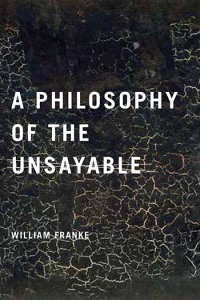
This monograph proposes an original philosophy pivoting on analysis of the limits of language and explains why the encounter with what exceeds speech has become the crucial philosophical issue of our time. It also offers readings of literary texts, especially the poetic oeuvres of Paul Celan and Edmond Jabès, in which the philosophical principles worked out on a theoretical plane are illustrated and put into practice. Finally, it engages with philosophical theologies and philosophies of religion in the debate over negative theology, demonstrating the irresistible infiltration of negative theology into the thinking even of those who attempt to deny or delimit it. Both extremes of Radical Orthodoxy and Secular Theology share in common not very fully acknowledged and sometimes explicitly repudiated premises in negative or apophatic theology, which surprisingly emerges as key to fostering genuine possibilities for dialogue among even the most antagonistic approaches to philosophical theology on the scene today.
From University of Notre Dame Press
“William Franke is an articulate spokesman for what cannot be said not only with regards to modern European poetry but also with respect to contemporary theology. A Philosophy of the Unsayable is essential reading for everyone working in religion and literature and in modern theology.” — Kevin Hart, Edwin B. Kyle Professor of Christian Studies, University of Virginia
“By now, it would seem that there could be no more to say about not-saying. Apophatic language and negative theology have been accused of meaninglessness, nihilism, and even ill-concealed ontologies. In this lovely and surprising book, William Franke not only deftly undoes these criticisms but shows that apophasis underlies and strangely grounds all language and thought, even of those very discourses that most vigorously reject it. A Philosophy of the Unsayable demonstrates with elegance that there is indeed more to say, and more that is both meaningful and important.” — Karmen MacKendrick, Professor of Philosophy (Joseph C. Georg Endowed Professorship of Philosophy, 2009-12), Le Moyne College
“William Franke is an eminent scholar in comparative literature, who is schooled in philosophy and religion. He is recognized as one of the most creative contemporary thinkers working at the double intersection of philosophy and literature and philosophy and theology. A Philosophy of the Unsayable shows an intellectual grasp of a dizzying array of discourses and sheds real light on all thinkers who are discussed.” — Cyril O’Regan, Huisking Professor of Theology, University of Notre Dame
“William Franke is a major voice in current discussions of “Religion and Literature.” One thing that makes him unusual, as well as highly valuable, is that unlike most people in the area he has a broad knowledge of philosophy, both ancient and modern; another unusual characteristic of this author is that his writing is firmly based in meticulous scholarship in several European languages. I have long been an admirer of his work, and I am pleased to say that the substantial typescript I have been given to read, A Philosophy of the Unsayable, has all the desirable qualities I have just indicated. There is one further quality that makes Professor Franke an author that Notre Dame University Press will want to retain: he writes a remarkably clear and engaging prose.”—(Senior scholar writing anonymously for UNDP)
INTERNET FORUMS
Martin Shuster, Realism and Ineffability
Boston University IPR Blog: Silence and Resilience in Suffering
REVIEWS
“William Franke has emerged as our foremost purveyor of what cannot be said.. . .this is a remarkable text, and deserves close attention at every level. Like all important texts, it raises questions for further interrogation.”
– Andrew W. Hass, editor of Literature and Theology (Oxford University Press).
Andrew W. Hass, Literature and Theology
“Franke’s book is . . . a thoughtful, provoking and often helpful exploration of an intellectually and spiritually demanding discourse.” George Pattison, Theology 111 (2): 144-46
Brett Gray, Anglican Theological Review
Brett Gray review of A Philosophy of the Unsayable pdf
A Philosophy of the Unsayable

Symposium Introduction
by Kendall Cox
In A Philosophy of the Unsayable, William Franke examines the “valences and varieties” of what cannot be said—from the indeterminacy of language to the infinite openness of thought to the ineffability of the divine and the unspeakability of suffering. The work reflects Franke’s depth of study across the fields of philosophy, theology, and literature as a professor of Comparative Literature and Religious Studies at Vanderbilt University and of Philosophy and Religions at the University of Macao. Here he condenses and clarifies some of the main themes and assertions of his two edited volumes On What Cannot Be Said: Apophatic Discourses in Philosophy, Religion, Literature and the Arts (2007). Both projects draw attention to “apophasis” as a distinct genre that spans a host of related disciplines. Franke’s concern is to identify and set in conversation certain resources in the Western intellectual tradition that figure as “a kind of perennial counter-philosophy to the philosophy of Logos” (1). “Apophasis” specifically designates, for him, the “negation”—namely the “self-negation”—of discourse (80). Franke discerns within discourses as manifold and varied as Neoplatonism, negative theology, medieval mysticism, Romantic poetry, Death of God theology, Radical Orthodoxy, and especially contemporary continental philosophy “major monuments” of what he calls an “apophatic culture” (2). He concludes the work with the claim that “apophaticism is the soul of philosophy inasmuch as it critically questions everything that can be believed” (328).
In the first few chapters of A Philosophy of the Unsayble, Franke examines the theme of unsaybility in literature. Peppered with epigraphs and insights from literary figures such as Shakespeare, Rilke, Hölderlin, Dickenson, Beckett and many others, in these initial theoretical and literary-critical reflections, Franke turns to Hegel and post-Hegelian philosophy (chapters 1-2) as well as the “pathbreaking” post-holocust poetry of Paul Celan and Edmond Jabès (chapter 3) (83). In the second half of the book, Franke more explicitly examines the relationship between philosophy and theology, enacting the “trans-philosophical thinking” he commends (5). One of his goals is “to situate apophatic thought as key to some of the most challenging developments and disputes in the philosophy of religion today” and “to mediate and unblock the deadlock between secularizing…and theologizing approaches” (274). He attempts to bridge discourses as apparently polarized as the “postsecular religious revivalist philosophy” (or Radical Orthodoxy) of figures such as John Milbank, Catherine Pickstock, and Graham Ward, on the one hand, and the secular or atheistic philosophy of Thomas Altizer, Slavoj Žižek, Alain Badiou, Giorgio Agamben, and John Caputo, on the other (chapters 4-7). Franke says these discourses have a “common basis in critical, apophatic insight” (270). Apophasis is “the missing link.
The way Franke relates philosophy, theology, and literature is a common thread in the responses comprising this symposium on his work. Franke believes that in the face of “what cannot be said,” 1) philosophy “necessarily becomes literary” and 2) language is pushed “in a direction which is best understood as theological” (4).
Sai Bhatawadekar highlights the performative quality of a “philosophy of the unsayable,” integrating humor, hymnody, as well as some of her own aphoristic rhymes into her response. Bringing together modern German philosophy and South Asian Studies, Bhatawadekar’s engagement with Franke is set against the backdrop of her upbringing in a Hindu household where, she says, the “bizarre appearances” of various gods and goddesses represented “very imaginative yet ultimately feeble attempts of depicting something beyond human capacities.”
Kevin Hart, himself a theologian, philosopher, and poet, is well aware of the sorts of resonances Franke identifies across these distinct discourses. However, he is wary of collapsing the differences between the contemplative practices of medieval mysticism and, for example, the brokenness of language that marks post-Holocaust German literature. Hart suggests teasing out more thoroughly the various “modes” in which unsayability “impinges on us.” He also notes the fact that apophasis “is ineluctably tied to” kataphasis—a point Aaron Simmons makes as well. Writing from the perspective of modern philosophy of religion, Simmons raises a number of other important questions, including whether the “ground between philosophy, literature, and religion” might “be made a bit less slippery” and whether the discussion would benefit from a broader engagement with analytic philosophy and epistemology.
In light of the poetic and theological quality of Franke’s writing, Stephen Palmquist specifically considers the question of whether it is “properly named philosophy.” He believes Franke’s claims about apophatic language could be grounded more clearly in an apophatic logic that can make “sense out of language that might otherwise appear to be but a literary game.” William C. Hackett too draws attention to the problem of language and identity. His response to Franke takes the form of an extended reflection on Aristotle’s understanding of metaphor in light of Franke’s criticism that metaphysics has been “interpreted narrowly as a deductive system and without regard for its allusive and largely poetical power of vision” (39). Hackett, like Franke and some of the other panelists, notes the close affinity between the kind of apophatic questioning Franke describes and religious commitment. But Hackett wonders whether Franke’s valorizing of “leaving the question of religion undecided” (269) is itself “an a priori decision constricting the possibility of divine revelation” such that “the a priori character of (absolute) indecision” becomes a nihilistic “affirmation of the impossibility of a last word.”
In all, one of the most valuable dimensions of the book that surfaces in this symposium is the profound connection between thought and life within Franke’s “philosophy of the unsayable.” It embodies the fact that, in Simmons’ words, at its best “philosophy is itself lived engagement.”
Panelists
Christopher Hackett
Stephen R. Palmquist
J. Aaron Simmons
Kevin Hart
Sai Bhatawadekar
About the Author
William Franke is professor of philosophy and religions at the University of Macao and professor of comparative literature and religious studies at Vanderbilt University.
COMMENTARIES
SYMPOSIUM EDITOR
Project Muse Search Browse Download
Comment by Ronald L. Hall, International Journal for Philosophy of Religion (2013) 73:1–3 3, on component article,
“Apophasis as the Common Root of Radically Secular Radically Orthodox Theology
pdf
Franke_PhilosophyOfUnsayable_Announcement
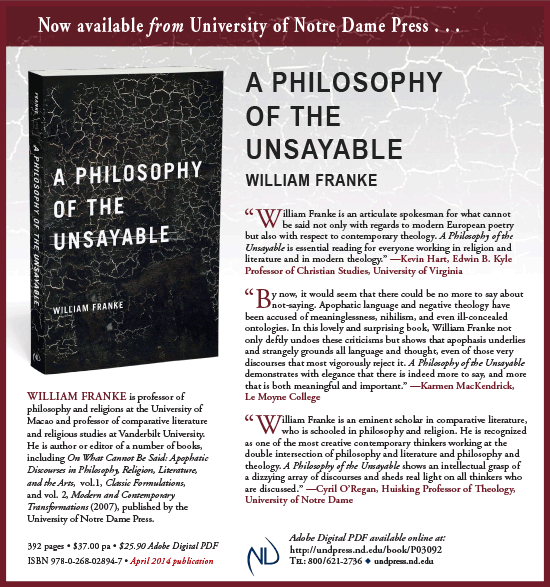
For detailed critical engagement by 14 philosophers and cultural critics, see:
Contemporary Debates in Negative Theology and Philosophy
Dante and the Sense of Transgression: “The Tresspass of the Sign”
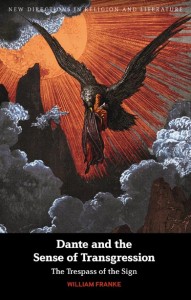
Order Form.pdf
Dante and the sense of Transgression Order Form 2013.pdf
Hardcover edition: Continuum: New Directions in Religion and Literature Series
ISBN: 9781441160423 (paperback) 9781441136916 (hardcover)
200 pages
In Dante and the Sense of Transgression, William Franke combines literary-critical analysis with philosophical and theological reflection to cast new light on Dante’s poetic vision. Conversely, Dante’s medieval masterpiece becomes our guide to rethinking some of the most pressing issues of contemporary theory.
Beyond suggestive archetypes like Adam and Ulysses that hint at an obsession with transgression beneath Dante’s overt suppression of it, there is another and a prior sense in which transgression emerges as Dante’s essential and ultimate gesture. His work as a poet culminates in the Paradiso in a transcendence of language towards a purely ineffable, mystical experience beyond verbal expression. Yet Dante conveys this experience, nevertheless, in and through language and specifically through the transgression of language, violating its normally representational and referential functions. Paradiso’s dramatic sky-scapes and unparalleled textual performances stage a deconstruction of the sign that is analyzed philosophically in the light of Blanchot, Levinas, Derrida, Barthes, and Bataille, as transgressing and transfiguring the very sense of sense.
****
“Written in elegant and astonishingly readable prose, William Franke’s volume gives a lucid portrait of a fundamental question that lies at the heart of Dante’s Divine Comedy and has resurfaced in contemporary French philosophical reflection: poetic theology as a radical, transgressive mode of knowledge. In mapping the ground of this fascinating debate, William Franke places Dante at the boundaries of thought and recovers the timeliness of his spiritual vision. This book is a must-read for historians of religion, Dante scholars, literary critics, and adepts of cultural studies.” — Giuseppe Mazzotta, Yale University, USA
“Can language meaningfully point us to the divine? Is it possible for us to transcend our humanity to touch the mystery which surrounds it? How might the idolatrous projections of our ego be transgressed? These are just some of the questions provoked by William Franke’s scintillating book. By bringing Dante’s Paradiso and French Theory into mutually illuminating dialogue, Franke invites his readers to explore the outer limits of sense and meaning, and to consider seriously the theological implications of the unknowing at the heart of literary expression. His reflections will spark the interest not only of Dante scholars, theologians and literary theorists, but of anyone interested in probing the connections between literature and theology.” – Vittorio Montemaggi, University of Notre Dame, USA
****
Interview with Chris Benda–Podcast
George Corbett, Speculum 89/4 (2014) 1139-40
Christian Moevs, Religion and Literature 47/2 (Summer 2015): 166-68
“Overall, Franke’s argument is both balanced and nuanced; he presents Dante as neither reactionary nor revolutionary, but, rather, as devout transgressor. Franke skillfully incorporates other arguments about transgression, such as Giuseppe Mazzotta’s claim that Dante transgresses and transcends ethics in Paradiso to a world “of ludic play and aesthetic performance” (107). Franke also does an excellent job of distinguishing Dante’s thought from French philosophy while addressing the similarities between medieval apophaticism and French deconstructionism. He does not wish to turn Dante into a deconstructionist philosopher, nor does he attempt to transform deconstructionist philosophy into medieval theology. Rather, he puts them into fruitful conversation with each other.” –T. Niebuhr, Christianity & Literature 63 (September 2014 ): 533-536
“William Franke has brought the harvest of French theory (especially Blanchot, with some Bataille, Barthes, Foucault, Derrida, and, in an appendix, a good dose of Levinas) to bear upon Dante’s Paradiso, focusing on the notion of transgression. He ably traces the many senses in which Dante’s text, so apparently intent on affirming order, is in fact transgressive, and obsessed dualities, such as between the human and the divine, undone in a trasumanar. . . .
Franke is wonderfully, persistently clear, as precise as one can be in elucidation ofFrench thought. The exercise of reading those texts with and against the Paradiso illuminates both, as well as what is at stake for both literature and philosophy or theology.” – Christian Moevs, Religion & Literature 47/2 (Summer 2015): 166-68
Book Colloquium in Tokyo, Japan on Dante and the Sense of Transgression:
Transgression and Transcendence: What Makes Religion Radical? International Symposium on Dante and the Sense of Transgression at ICU (International Christian University), Tokyo, Japan, October 10-12, 2013
ICU conference posterICU conference poster 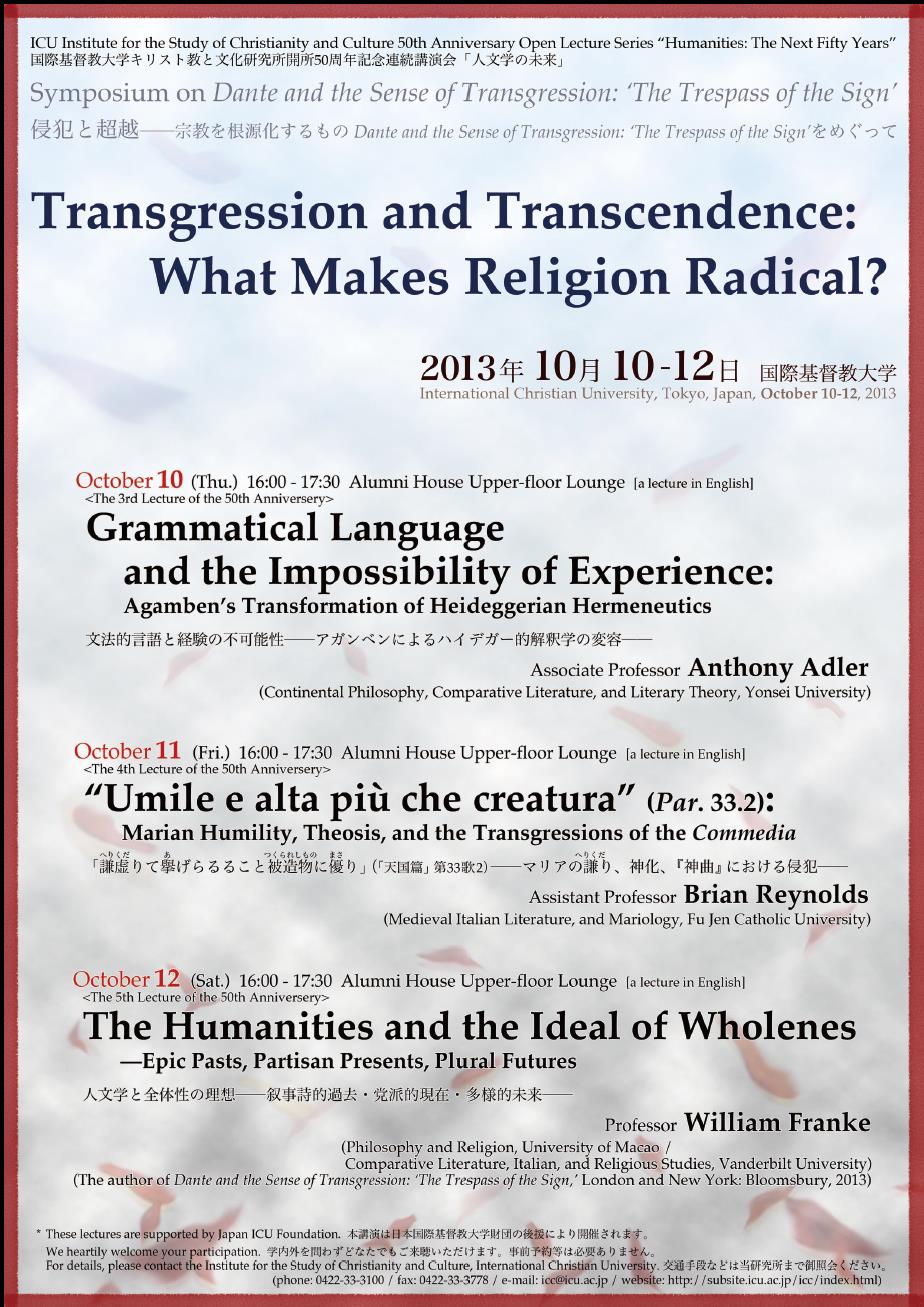
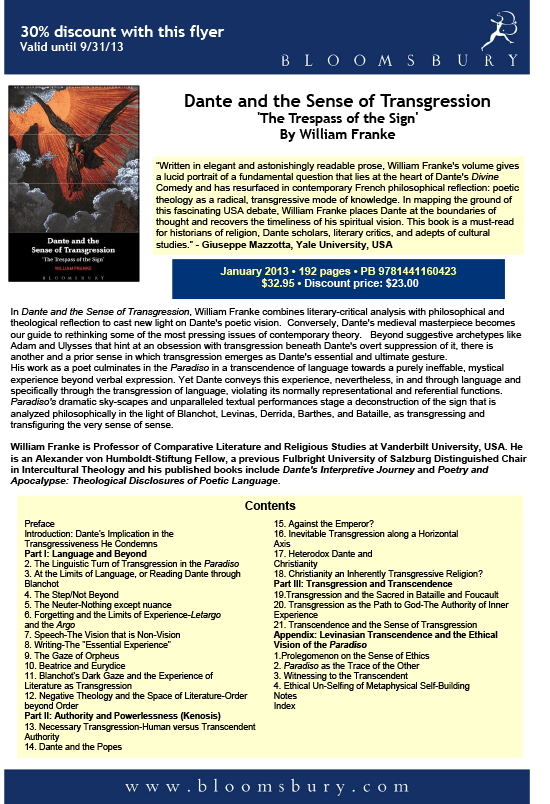
Poetry and Apocalypse
Poetry and Apocalypse: Theological Disclosures of Poetic Language
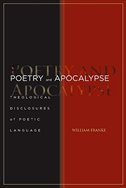 Stanford University Press, 2009
Stanford University Press, 2009
reviews, excerpts, etc.
selections at: Google Books
Poetry and Apocalypse offers an interdisciplinary synthesis, combining a philosophical theory of dialogue, a literary-critical interpretation of poetic language in the apocalyptic tradition, and a negative theology that renews certain fundamental impulses and insights of revealed religion. It is concerned with finding the premises for dialogue between cultures, especially between religious fundamentalisms, like the Islamic, and modern Western secularism. The thesis is that dialogue in general, in order to be genuinely open, needs to be able to open up to such a possibility as religious apocalypse in ways that can be understood best through the experience of poetry. The book interprets the Christian epic and prophetic tradition as a secularization of religious revelation that nevertheless preserves an understanding of the essentially apocalyptic character of truth and its disclosure in history. The usually neglected negative theology that undergirds this apocalyptic tradition provides the key to a radically new and open understanding of apocalypse as inextricably religious and poetic at the same time.
Reviewed by:
Joel Harter, Journal of Religion 90 (2010): 104-106 (pdf version)
Dorothy Z. Baker, Comparative Literature Studies 46/4 (2009): 674-676
Lee A. Jacobus, James Joyce Quarterly 46/3-4 (2009): 624-627 In Project Muse
Larry D. Bouchard, Religion and Literature 43/3 (2011): 249-52 (pdf)
J. H. Sims, CHOICE: Current Reviews for Academic Libraries 46.9 (May 2009): p1679.
“Poetry and Apocalypse: Theological Disclosures of Poetic Language is a profound and radical study that holds many surprises . . . [W]e have long been convinced of the relevance of studies in religious thought, philosophy, and anthropology to literary scholarship. Poetry and Apocalypse gives evidence of the importance of literature and literary hermeneutics to religion, philosophy, and anthropology.”—Dorothy Z. Baker, Comparative Literature Studies
“The book’s stated objective is ‘a postmodern negative theology of poetic language’ (ix) that is both theoretical and practical, contributing to both literary theory and theology and promoting peace through radical openness to dialogue, and it is to Franke’s credit that the result is both challenging and accessible.”—Joel Harter, The Journal of Religion
” . . . a performed negative theology. At such wakes and festivals, it is the praxis of recursive conversations—Poetry and Apocalypse being an excellent example—that disclose, indirectly, possibilities of transcendent openness.”—Larry D. Bouchard, Religion and Literature
“Poetry and Apocalypse will appeal to critics who credit a Christian interpretation of Joyce’s texts in part because its premises are carefully argued and theoretically balanced.” —Lee A. Jacobus, James Joyce Quarterly
“The importance of Poetry and Apocalypse resides in the clarity of Franke’s views of the necessary relations between literature and theology as well as the authority that these views have by dint of being grounded in his deep knowledge of canonical sacred and secular literature over the centuries. I should also say that Franke is his own man; he does not represent a ‘school’ or even a fashion, and his book marks an original contribution to the growing field of religion and literature.” —Kevin Hart, Monash University and University of Notre Dame
“This is an ambitious book. It takes on big topics, difficult writers, and a range of discourses. Authors who venture into topics like ‘poetry and apocalypse’ are usually comfortable with big ideas and forays into theoretic discourse that shy away from concrete literary analysis. Among Franke’s virtues is his ability to do both in a prose that is graceful and accessible.” —Peter Hawkins, Boston University
“Franke’s theory of poetic language as negative theology is persuasive and helpful in illuminating the complex relationship between religion and literature.” —Joel Harter, The Journal of Religion
Translation into German by Michael Sonntag and Ursula Liebing:
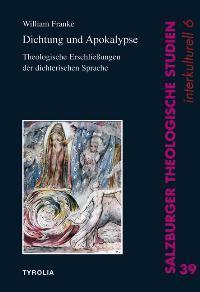 Dichtung und Apokalypse:
Dichtung und Apokalypse:
Theologische Erschliessungen der dichterischen Sprache
Aus dem Amerikanischen von Ursula Liebing und Michael Sonntag
Salzburger Theologische Studien Band 39
University of Salzburg Studies in Theology, vol. 39 (Intercultural 6)
Insbruck: Tyrolia Press, 2011
ISBN 978-3-7022-3050-0
(216 pages)
Dichtung und Apokalypse sucht nach den Prämissen eines Dialogs zwischen den Kulturen, insbesondere zwischen religiös-fundamentalistischen und modern-säkularistischen Haltungen. Die These ist, dass Dialog generell, um wirklich offen zu sein, sich für die Möglichkeit der religiösen Apokalypse öffnen muss. Eine solche Möglichkeit lässt sich am besten über die dichterische Erfahrung verstehen. In diesem Sinne wird die christliche Epik in die Tradition der prophetischen Überlieferung eingebunden und als eine Säkularisierung der theologischen Offenbarung ausgelegt. Ihre Sichtweise besteht dennoch auf dem wesentlich apokalyptischen Charakter von Wahrheit und ihrer Erschließung im Laufe der Geschichte. Die oft vernachlässigte Negative Theologie, die dieser apokalyptischen Überlieferung zu Grunde liegt, bietet den Schlüssel für ein neues und offenes Verständnis von Apokalypse in ihrer stets zugleich dichterischen wie religiösen Natur.
WILLIAM FRANKE ist Professor für Vergleichende Literaturwissenschaft und für Religionswissenschaften an der Vanderbilt University in Tenessee / USA. Nach abgeschlossenen Magisterstudien in Philosophie und Theologie an der Oxford University und einem Doktorat in Komparatistik an der Stanford University war er Alexander von Humboldt-Stipendiat an der Universität Potsdam und Gastprofessor für Vergleichende Literaturwissenschaft an der University of Hong Kong, sowie zuletzt Fulbright Professor am Zentrum Theologie Interkulturell und Studium der Religionen an der Universität Salzburg (2008). Zu seinen Publikationen zählen philosophische Betrachtungen über Dante und verschiedene Dichter und Denker von den Griechen (z.B. Homer, Damascius) bis zur Postmoderne (Derrida, Celan etc.), sowie als bisherige Monographien Dante’s Interpretive Journey (University of Chicago Press, 1996) und On What Cannot Be Said: Apophatic Discourses in Philosophy, Religion, Literature and the Arts (University of Notre Dame Press, 2007).
On What Cannot Be Said
On What Cannot Be Said: Apophatic Discourses in Philosophy, Religion, Literature, and the Arts
Publisher’s Website: University of Notre Dame Press, 2007 Cover Image
Amazon link
These volumes propose to bring into comparison with one another some of the most enduringly significant attempts, in different disciplines within Western culture, to define the limits of language, and perhaps to exceed them. The tradition of negative theology is compared with poetry of the ineffable and philosophical reflections on language that tend to define areas of inviolable silence. As pervasive a problem as the language of the unsayable in Western tradition can best be treated at the intersection between disciplines, signally philosophy, theology, and poetry. It is, moreover, not the property of any one national tradition, nor is it peculiar to any historical period, and it demands the wide-ranging comparative treatment that this volume proposes. Bringing together different disciplinary and cultural backgrounds is part of a design to catalyze open dialogue on “what cannot be said” lurking as an ineluctable provocation perhaps in all discourses. An anthology of classical and contemporary readings that have been milestones in the apophatic tradition is a resource that is most necessary to serve this dialogue that is already well underway and gaining in intensity. The excerpted are itnroduced by detailed critical-theoretical essays, and the volumes are furnished each with general introductions and prefaces outlining a history of apophasis, ancient and modern, and a theory of apophasis as a genre and a mode of discourse.
From Reviews of On What Cannot Be Said
“These two volumes successfully realize a massive project: to propose and delineate a new field of discourse that provides a fresh approach to Western thought as a whole. In short, William Franke demonstrates the centrality of apophaticism, ‘what cannot be said,’ to the Western tradition, from Plato (and before) to Derrida (and beyond). . . . Franke’s work is nothing short of brilliant. . . . Franke shows incredible breadth of knowledge, critical acumen, and creative prowess throughout . . . . . [The] two volumes [are] essential reading for philosophers, theologians, literary scholars, intellectual historians, critical theorists—in short, anyone interested in an illuminating and vital perspective on just about any facet of Western arts and letters.”
“. . . One of the most important and original contributions to the discussion of apophasis in recent years. . . . Franke’s historical and disciplinary range, in light of his well-written and compelling essays, provides an illuminating insight into the pervasiveness of apophatic discourse. . . . Few others, maybe no others, provide the same clarity, coherence, and scope; few, maybe none, provide the same provocation to think further and more deeply, to think otherwise the tradition from which we come.”
“As an introduction to the phenomenon of apophatic discourse, Franke’s anthology is a great success. It often displays astounding breadth of knowledge and scholarship on the part of its editor. . . . This volume offers the only introductory anthology of negative theology that I know of, and it is superb.”
—Bruce Milem, The Heythrop Journal, 51, no. 1 (2010): 174-175
“The genius of Franke’s two-volume critical anthology on apophatic discourses is the work’s breadth and depth of engagement with the concept in variously distinct and even conflicting contexts.”
“The last and perhaps most commendable attribute of this volume for students in need of a reader like it is the remarkable quality of Franke’s critical introductions for each text. These introductions demonstrate a depth and range of insight available only through careful and thorough research. It may be enough to merely collect these various sources in one place, but Franke has gone much further than that with the critical preparations he provides the reader for each new text. Each work sampled in the anthology receives a combination of the following: explanation of the historical context for the text, biographical details about the author, brief examination of the critical issues related to interpreting the text, discussion of the history of reception for the text, and thematic connections for the unit and the anthology to the particular text under consideration. In many cases, Franke provides his own translation of the works that he adds to his collection, and his attention to detail in this translation effort is evident on nearly every page. These characteristics alone inspire great confidence in the editor’s careful consideration of and familiarity with the long, strange story of apophatic literature in Western culture. The additional benefit of introducing each work so carefully provides scholars both a convenient and reliable guide for apophatic texts previously unknown and also makes this collection an excellent resource to use with students in undergraduate and graduate courses. On What Cannot Be Said will be a leading resource for anyone studying apophasis and negative theology for many years to come.
Worley Review of On What Cannot Be Said_ Apophatic Discourses in Philos (click above to download complete review)
Worley Review on Academia.edu
Alois Halbmayr and Gregor Maria Hoff:
“Einen wichtigen Schritt auf dem Weg zu einer Geschichte der Negativen Theologie machen die beiden jüngst erschienenen, vorzüglich editierten und kommentierten Reader von Franke, William (Hg.), On What Cannot be Said. Appophatic Discourses in Philosophy, Religion, Literature and the Arts. Vol. I: Classic Formulations; Vol. II: Modern and Contemporary Transformations, Notre Dame 2007. Die Einleitungen lassen sich bereits als eine komprimierte Geschichte der Negativen Theologie lesen.”
(The two superbly edited and commented volumes of the recently published reader of William Franke represent an important step on the way to a history of Negative Theology. On What Cannot be Said. Appophatic Discourses in Philosophy, Religion, Literature and the Arts. Vol. I: Classic Formulations; Modern and Contemporary Transformations, Notre Dame 2007. The introductions alone can be read as a compressed history of Negative Theology.)
From Negative Theologie Heute? Zum aktuellen Stellenwert einer umstrittenen Tradiition, eds. Alois Halbmayr and Gregor Maria Hoff (Freiburg-Basel-Wien: Herder, 2008). Introduction, p. 10.
“Lo scopo ambizioso e riuscito dell’antologia è proprio quello di mostrare la ricchezza delle espressioni del discorso apofatico che si registra nell’intero arco della filosofia occidentale, da Platone a J.-L. Marion, non tralasciando il suo rilievo in ambito teologico e in quello letterario.”
(The ambitious and achieved aim of the anthology is to demonstrate the richness of the expressions of apophatic discourse as registered in the entire arc of Western philosophy from Plato to J.-L. Marion; it does this, moreover, without neglecting the importance of apophatic discourse also in the fields of theology and literature.)
–Andrea Aguti, Humanitas (2009)
“For a comprehensive survey of the apophatic tradition from Plato to Derrida in all its aspects see the introduction and critical essays in William Franke’s impressive two-volume anthology, On What Cannot Be Said: Apophatic Discourses in Philosophy, Religion, Literature, and the Arts.”
–Noam Reisner, Milton and the Ineffable (Oxford University Press, 2009), 8n
Materialism, Mysticism, and Art blog
Marilynne Robinson citation and comment in COMMONWEAL:
March 09, 2012
Article. Imagination & Community
What Holds Us Together
Marilynne Robinson
Over the years I have collected so many books that, in aggregate, they can fairly be called a library. I don’t know what percentage of them I have read. Increasingly I wonder how many of them I ever will read. This has done nothing to dampen my pleasure in acquiring more books. But it has caused me to ponder the meaning they have for me, and the fact that to me they epitomize one great aspect of the goodness of life. Recently I bought a book titled On What Cannot Be Said: Apophatic Discourses in Philosophy, Religion, Literature, and the Arts, Volume One: Classic Formulations. The title itself is worth far more than the price of the book, and then there is the table of contents. So far I have read only the last and latest selection, from The Wandering Cherub by Silesius Angelus, who wrote in the seventeenth century.
In the stack of magazines, read and unread, that I can never bring myself to throw away, there are any number of articles suggesting that science, too, explores the apophatic—reality that eludes words—dark matter, dark energy, the unexpressed dimensions proposed by string theory, the imponderable strangeness described by quantum theory. These magazine essays might be titled “Learned Ignorance,” or “The Cloud of Unknowing,” or they might at least stand beside Plato’s and Plotinus’s demonstrations of the failures of language, which are, paradoxically, demonstrations of the extraordinary power of language to evoke a reality beyond its grasp, to evoke a sense of what cannot be said.
I love all this for a number of reasons, one of them being that, as a writer, I continually attempt to make inroads on the vast terrain of what cannot be said—or said by me, at least. I seem to know by intuition a great deal that I cannot find words for, and to enlarge the field of my intuition every time I fail again to find these words. That is to say, the unnamed is overwhelmingly present and real for me. And this is truer because the moment it stops being a standard for what I do say is the moment my language goes slack and my imagination disengages itself. I would almost say it is the moment in which my language becomes false. The frontiers of the unsayable, and the avenues of approach to those frontiers, have been opened for me by every book I have ever read that was in any degree ambitious, earnest, or imaginative; by every good teacher I have had; by music and painting; by conversation that was in any way interesting, even conversation overheard as it passed between strangers.
Jeff L. Pool, Religious Studies Review 37 (March 2011): 41-42
‘. . . this two-volume anthology powerfully develops a linguistic theory alongside the very texts that one needs to measure the theoretical claims themselves. Franke’s work genuinely, even if ironically, both serves as a catalyst to initiate dialogue about “what cannot be said” or about “the ‘apophatic difference’ of the sayable from the unsayable,”and, perhaps most importantly for such ironic dialogue, increases possibilities for toleration of differences that remain “open infinitely.”’
Jack L. Sammons review:
This is a terrific collection of what might be considered the essential documents of apophatic discourse. This volume contains modern and contemporary versions of writings about that which cannot be said. The introduction is excellent, although really it is more of an article on its own than an introduction, and each document is also very thoughtfully introduced, primarily by putting it in the overall context of the author’s work and giving a thought or two to how it relates to a central theme of negative theology. In fact, rather than entitling this “apophatic discourses, it might have been better to say that these are (mostly) secular discourses about negative theology for this, it seems to me, is the author’s true interest. In any case, the book is extremely useful for anyone thinking about that which cannot be said. There are surely quibbles — well, more than quibbles — along the way with the author’s take on the various pieces, and some of the choices are, well, clearly idiosyncratic and perhaps eve a little strange. This, however, is inevitable in a collection such as this that breaks new ground in creating a discipline. While already familiar with most of the pieces, I truly enjoyed the journey that this collection creates. It’s a lovely bit of work.
Boston University Institute for Philosophy and Religion blog
–Ron Bernier writes: “I found much to admire and think further on in Dr. Schweizer’s talk, “The Poetry of Suffering and Waiting.” In particular I was struck by the consistency of the theme of the “silence” and “indecipherability” of sufferering – that the langauge of suffering, for both the afflicted in his/her solitude in pain and the “waiting” of he/she/we who attend on them is nameless or “unsayable.” This put me in mind of the theology and philosophy of apophasis – a form of discouse that fundamentally consists of langage that negates itself in order to evoke that which is beyond words, beyond the limits of saying altogether. ”‘Apophasis’ reads etymologically,” explains William Franke (professor of comparative literature and religious studies at Vanderbilt University; see his On What Cannot Be Said, Notre Dame, 2007), “as ‘away from speech’ or ‘saying away’ (apo, ‘from’ or ‘away from’; phasis, ‘assertion,’ from phemi, ‘assert’ or ‘say’), and this points in the direction of unsaying and ultimately of silence” (Franke, vol 1, 2). Apophasis is fostered by a notion fundamentally opposed to the central tenet of classical Greek philosophy of Being (or ontology) and its claims for autonomous human reason; it articulates, as it were, the utter inefficiency of the Logos to name ultimate reality. This prompts me to think more about the very possibility of the apophatic body – that is, beyond a matter of the inadequacy of linguistic communication, to what extent can we, as waiting attendant to the sufferer, enter into another type of communication with the apophatic material body.
Janice, McRandal, Christian Doctrine and the Grammar of Difference (2015), pp. 151-54
Dante’s Interpretive Journey
University of Chicago Press
Franke, William Dante’s Interpretive Journey. 261 p. 6 x 9 1996 Series: (RP) Religion and Postmodernism Series
Dante’s Interpretive Journey proposes a theory of the existential, theological structures of interpretation by which our lives in language are constructed. It brings the theological hermeneutics of Dante’s poem into contact with modern philosophical hermeneutics as developed particularly by Heidegger and Gadamer. It explores a variety of theories of interpretation, medieval and modern, in an attempt to open original insights into the nature of interpretation, notably its existential ground and openness to transcendence in directions traditionally conceptualized in terms of religious revelation.
Sample Pages
Incomplete on-line version
Short Description:
Critically engaging the thought of Heidegger, Gadamer, and others, William Franke contributes both to the criticism of Dante’s Divine Comedy and to the theory of interpretation.
Reading the poem through the lens of hermeneutical theory, Franke focuses particularly on Dante’s address to the reader as the site of a disclosure of truth. The event of the poem for its reader becomes potentially an experience of truth both human and divine. While contemporary criticism has concentrated on the historical character of Dante’s poem, often insisting on it as undermining the poem’s claims to transcendence, Franke argues that precisely the poem’s historicity forms the ground for its mediation of a religious revelation. Dante’s dramatization, on an epic scale, of the act of interpretation itself participates in the self-manifestation of the Word in poetic form.
Dante’s Interpretive Journey is an indispensable addition to the field of Dante studies and offers rich insights for philosophy and theology as well.
TABLE OF CONTENTS
Preface
Introduction: Truth and interpretation in the Divine Comedy
1: Historicity of Truth
2: Truth through Interpretation and the Hermeneutic of Faith
3: Interpretive Ontology: Dante and Heidegger
Ch. 1: The Address to the Reader
1: The Ontological Import of the Address to the Reader
2: Reader’s Address as Scene of the Production of Sense
3: Truth, Sendings, Being-Addressed: Deconstruction versus Hermeneutics or Dialogue with Derrida?
4: A Philological Debate: Auerbach and Spitzer
5: Petrarch, Boccaccio, and the Fiction of Philology
Ch. 2: Dante’s Hermeneutic Rite of Passage: Inferno IX
1: Blockage
2: Passage
3: Ambiguities
4: Appendix: Hermeneutics, Phenomenology, and the Meaning of a Modern Understanding of Dante
Ch. 3: The Temporality of Conversion
1: Interpretation as Ontological Repetition and Dante’s Fatedness
2: Ecstatic and Repetitive Temporality
3: Phenomenology of Fear/Anxiety in Inferno I
4: Dantesque Allegory and the Act of Understanding
Ch. 4: The Making of History
1: Relocating Truth: From Historical Sense to Reader’s Historicity
2: Reality and Realism in Purgatorio X
3: Some History (and a Reopening) of the Question of the Truth of the Commedia
Ch. 5: Resurrected Tradition and Revealed Truth
1: Dante’s Statius
2: Hermeneutics, Historicity, and Suprahistorical Truth
Recapitulatory Prospectus: A New Hermeneutic Horizon for Religious Revelation in Poetic Literature?
Core Bibliography of Recurrently Cited Sources
Index
Sample Pages
Google on-line version
REVIEWS
“. . . these may very well be some of the most important pages written on Dante in the last decade, if not the last half century. As Franke undertakes his rigorous theoretical definition and exploration of the terms that will continue to preoccupy him throughout his book, the reader is privileged to follow, from sentence to sentence, the workings of an outstanding philosophical intellect applying itself, at the highest level, to a text that eminently deserves but rarely receives such treatment. The case for Dante’s simultaneous historicity and contemporaneity, for what Franke calls ‘the synergism between interpretation theory and Dante’s interpretive practice’ (p. 4), is made here with a force and a precision that raise it to the level of genuine eloquence. . . . The introduction—like the rest of the book—should be read and pondered by anyone who cares about Dante, or poetry, or history, or theology, or interpretation, or truth, or, quite simply (and in the philosophical dialect dear to Franke), our human being-in-the-world.”
—Steven Botterill (editor-in-chief of Dante Studies), Comparative Literature vol. 50, No. 2 (Spring, 1998), p. 179
Reviewed by:
James Torrens, Christianity and LIterature 45.3/4, Spring/Summer (1996): 416-18 online review pdf
Claire Honess, The European Legacy 3/1 (1998): 153-154
Steven Botterill, Comparative Literature 50/2 (1998): 178-81 online review
Giuseppe Cavatorta, Lectura Dantis 20-21 (1997): 103-106
Stanley Benfell, Religion and Literature 31/2 (1999): 87-93
Joseph Luzzi, Italica 74/3 (1997): 412-13
Brian Horne, Literature and Theology 11/1 (1997)
Edward Donald Kennedy, The Comparatist 22 (1998): 204-05
Stephanie Paulsell, Religious Studies Review 24/3 (1998)
Elizabeth Mazzocco, Rivista di studi italiani 16/2 (1998): 554-555
Manfred Lenzen, Deutsches Dante-Jahrbuch 73 (1998): 214-15
John Dally, Journal of Religion 79/2 (1999)
John A. Scott, The Modern Language Review, April 1, 1999
Ronald L. Martinez, Speculum January 1999
Paolucci, Choice
Marcellina Troncarelli, Letteratura Italiana Antica 4 (2003): 524-26
Unpublished reviews by:
Giuseppe Mazzotta (see, however, Speculum, Vol. 74, No. 1 (Jan., 1999), pp. 187-189
Donald Marshall
Thomas Altizer
David Wood
Cited and/or discussed in:
Dante: Da Firenze all’aldilà (Atti del terzo Seminario dantesco internazionale, Firenze, 9-11 giugno 2000),ed, Michelangelo Picone (Florence: Cesati, 2001), p. 76 (My Italian interventions: pp. 121, 280)
Jennifer Margaret Frazer, Rite of Passage in the Narratives of Dante and Joyce (Gainesville: University Press of Florida, 2002)
John Took, Dante’s Phenomenology of Being (Glasgow: University of Glasgow Press, 2000)
Guy Raffa, Divine Dialectic: Dante’s Incarnational Poetics (Toronto: University of Toronto Press, 2000)
Amilcare Iannucci, “Already and Not Yet: Dante’s Existential Eschatology,”in Dante for the New Millennium, ed. Teodolinda Barolini and H. Wayne Storey (Fordham University Press, 2003), p. 438.
Giuseppe Ledda, La guerra della lingua: Ineffabilità, retorica e narrative nella Commedia di Dante (Ravenna: Longo, 2002)
Christine O’Connel Bauer, Dante’s Hermeneutics of Salvation: Passages to Freedom in the Divine Comedy
(Toronto: University of Toronto Press, 2007)
Rewriting Virgil in the Commedia
Christian Moevs, The Metaphysics of Dante’s Comedy (Oxford: Oxford University Press, 2005)
James Miller, Dante and the Unorthodox: The Aesthetics of Transgression (Canada: Wilfrid Laurier University Press, 2005), pp. 423-24
Sherry Roush, Herme’s Lyre: Italian Poetic Self-Commentary from Dante to Tommaso Campanella (2002)
T. A. Hipolito, “Ancient and Modern in Dante’s Vita Nuova,” Renasence (Winter 2003), p. 16
Else Jongeneel, “Art and Divine Order in the Divina Commedia,” Literature and Theology (2007)
Gregory B. Stone, Dante’s Pluralism and the Islamic Philosophy of Religion (New York: Palgrave, 2007), p. 285.
David Gibbons, Metaphor in Dante (Oxford: Legenda, 2002)
John Took, Dante’s Phenomenology of Being (Glasgow: University of Glasgow Press, 2000)
Winthrop Wetherbee, The Ancient Flame: Dante and the Poets (Notre Dame: University of Notre Dame, 2008)
Jeremiah Alberg, A Reinterpretation of Rousseau: A Religious System, Forward by René Girard (New York: Palgrave MacMillan, 2007)
_____________, Beneath the Veil of the Strange Verses: Reading Scandalous Texts (East Lansing: Michigan State University Press, 2012)
Raffaele de Benedictis, Worldly Wise: The Semiotics of Discourse in Dante’s Commedia (New York: Peter Lang, 2011), pp.
Marjorie O’Rourke Boyle, “Closure in Paradise: Dante Outsings Aquinas,” MLN 115, no. 1 (2001): 1-12.
[‘For the ontological import of the address to the reader, see William Franke, “Dante’s Intepretive Journey (Chicago: University of Chicago Press, 1996), 37-81. He specifically and correctly notes Dante’s opposition to Aquinas’s denial of “ontological efficacy and depth to poetic language,” p. 58.’]
Susan Schibanoff, Chaucer’s Queer Poetics: Rereading the Dream Trio (Toronto: University of Toronto Press, 2006)
“All this of course has been much debated by scholars, most interestingly I think by William Franke (1996), who weaves it into his brilliant Heideggerian reading of Dante as a whole.” — David M. Black, “Dante’s ‘Two Suns’: Reflections on the Psychological Sources of the Divine Comedy,” International Journal of Psychoanalysis 98:6, pp 1619-1717, December 2017, available online: http://www.tandfonline.com/[Article DOI].
Transcendence, Immanence, and Intercultural Philosophy, eds. Nahum Brown and William Franke
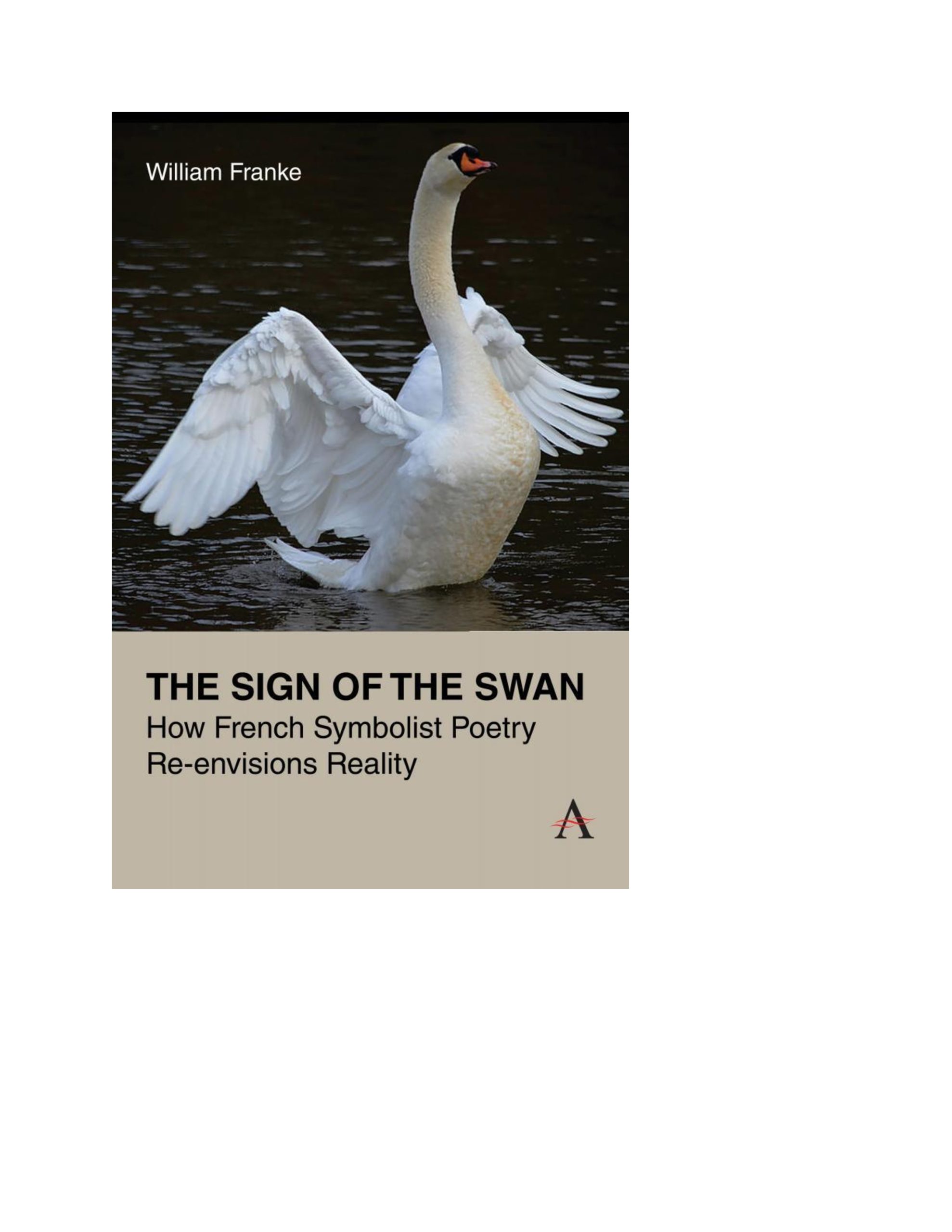
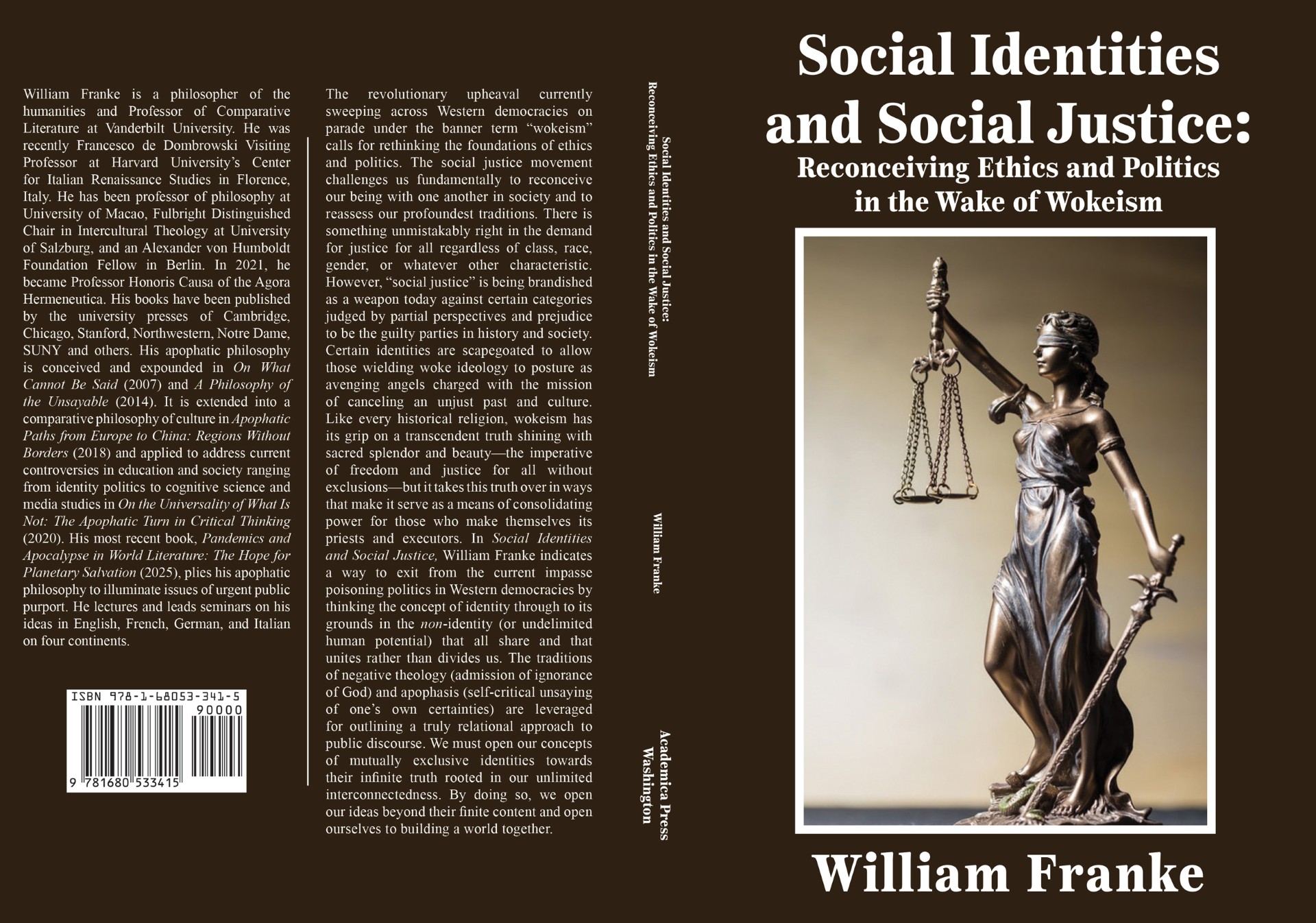
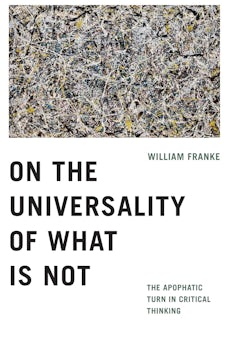
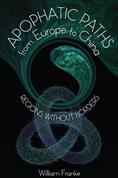
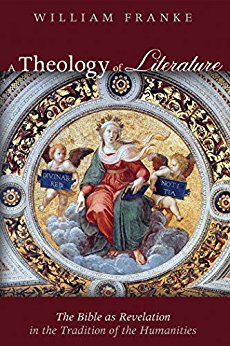
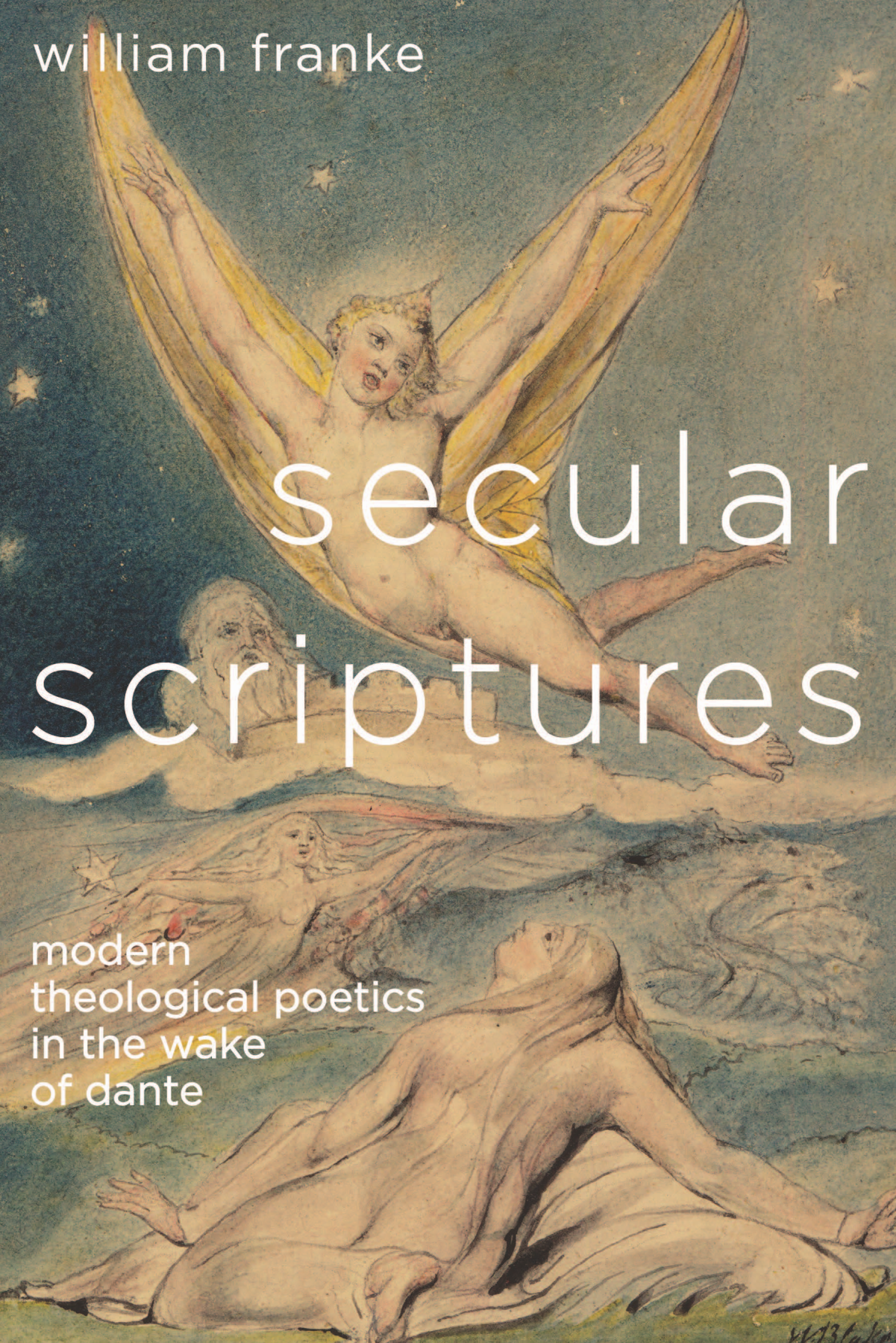
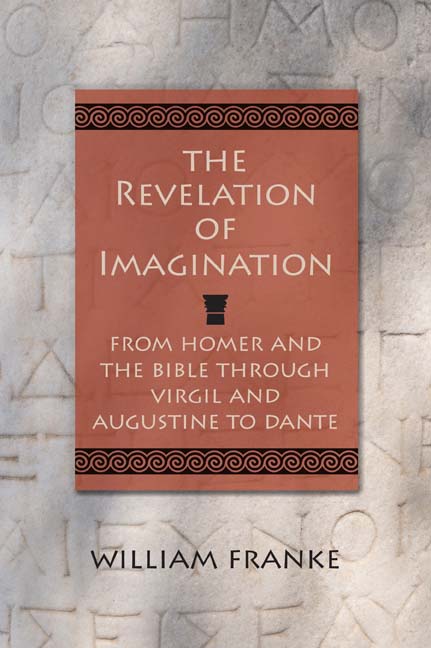
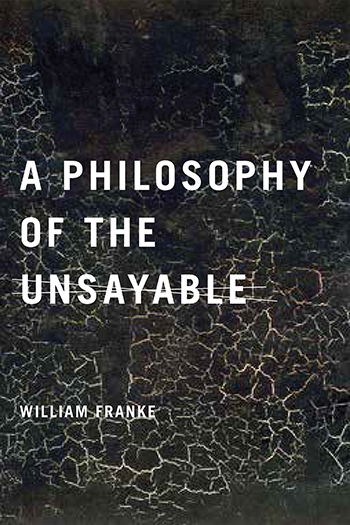
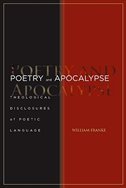
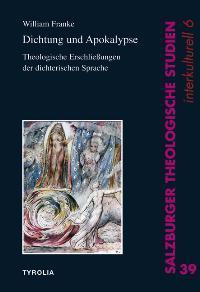
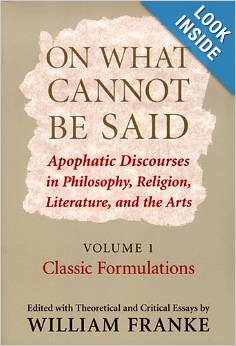
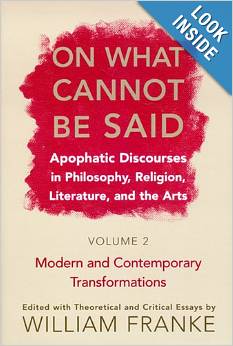
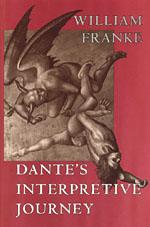

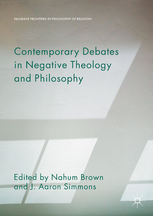
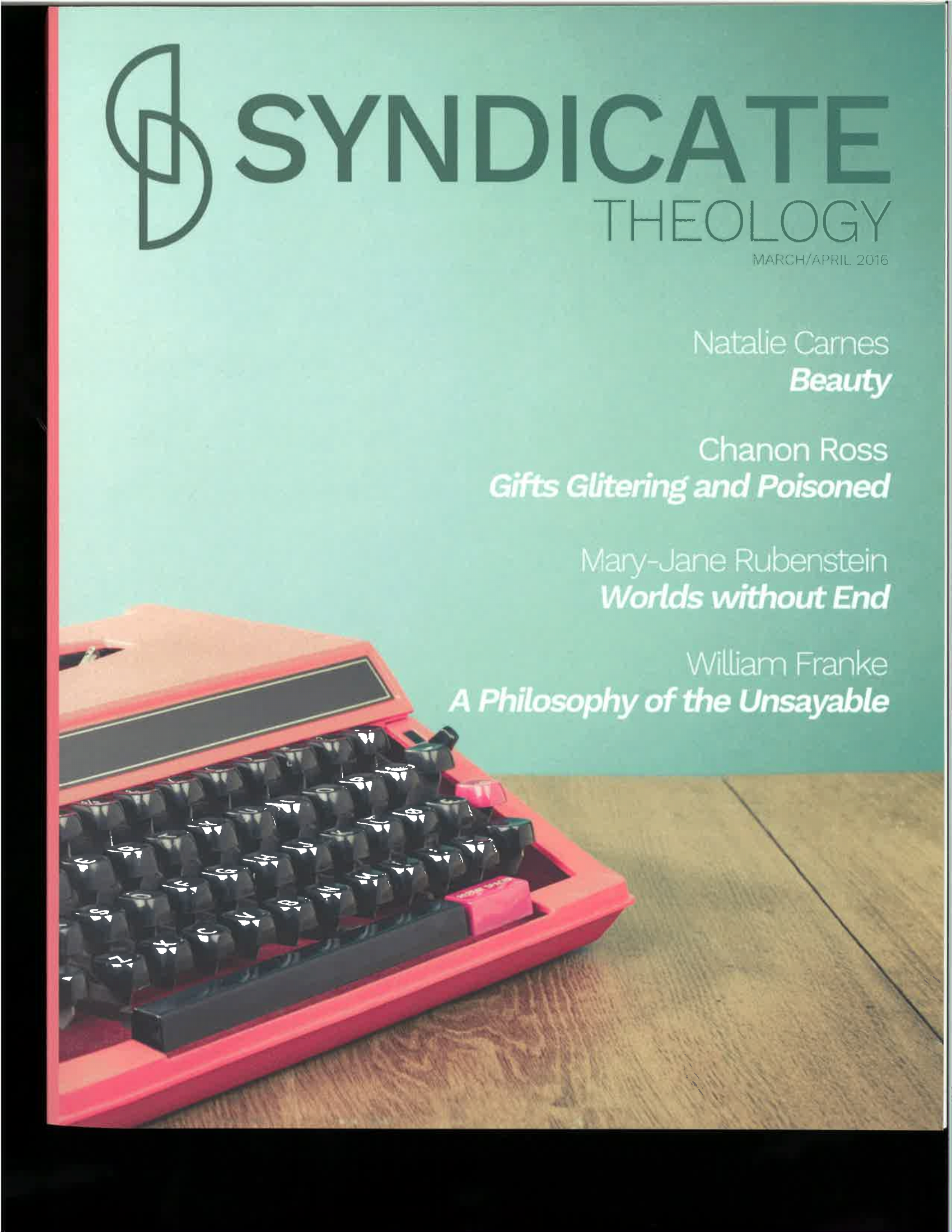
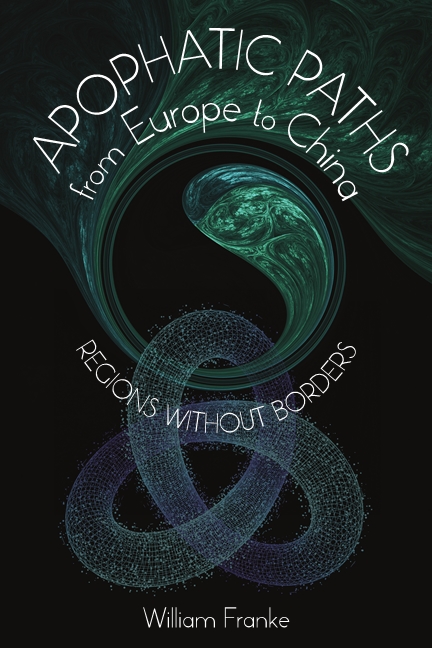
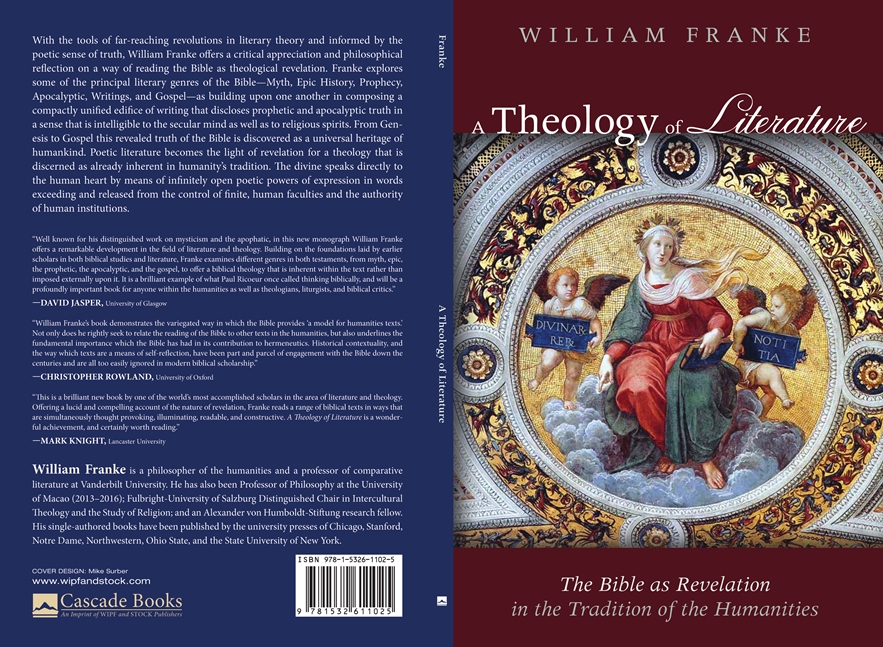
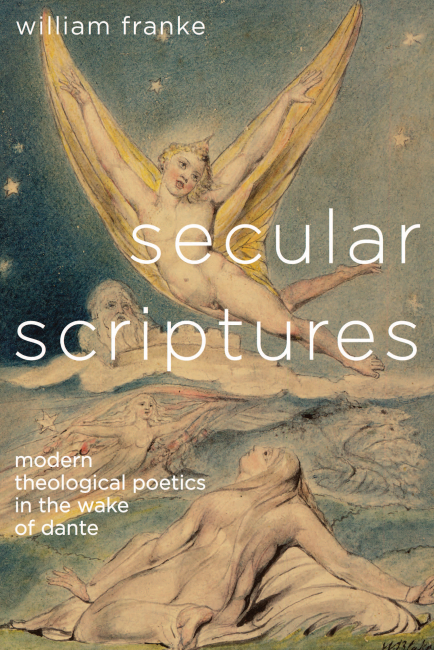
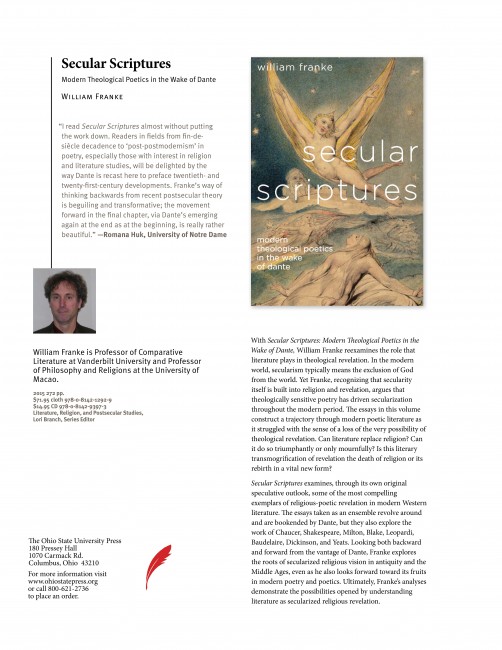
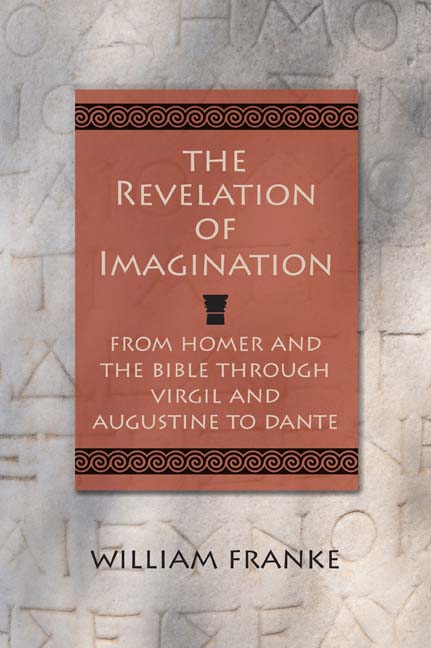





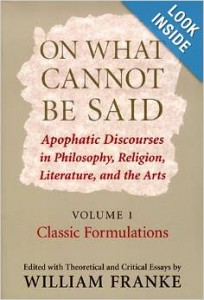
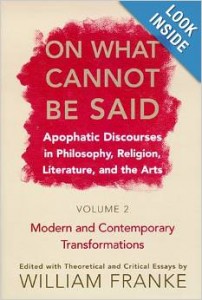
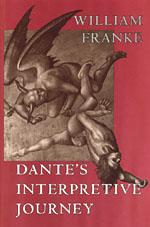
©2026 Vanderbilt University ·
Site Development: University Web Communications